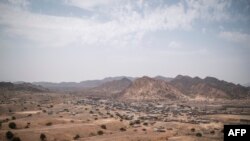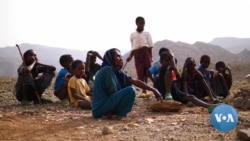As conflict in northern Ethiopia spreads into the Afar region amid lingering drought, some residents are appealing for help, saying they have nothing to eat and that their children are dying. Reporter Henry Wilkins spoke to locals in the town of Erebti and to aid workers who say the Afar regional administration should declare drought as a crisis to get needed assistance.
Aysha Mohammed lives by the side of the road in a makeshift camp on the edge of Erebti in northern Ethiopia’s Afar region. She says members of her family have died of hunger.
Mohammed says there is not enough food and drink, and they do not have enough clothes or blankets, adding, "We expect God first and then the government to help us.”
In November of 2020, the federal government went to war against rebels of the former ruling group, the Tigray People’s Liberation Front, or TPLF, in the northern Tigray region. The conflict weakened federal forces and contributed to the ongoing instability in the country. Mohammed is one of more than 5 million people displaced by the conflict.
The conflict disrupted humanitarian aid convoys to Tigray, which borders Afar. There have been concerns that aid destined for Tigray has been stuck in Afar.
The Famine Early Warning Systems Network, a U.S. agency tracking food insecurity, says Tigray could be in a state of famine. Fuel restrictions also make it difficult to distribute food to remote areas.
The Ethiopian government has alleged that TPLF attacks in Afar have compromised the passage of food trucks to Tigray. In recent weeks, however, World Food Program trucks have been able to deliver to Afar and Tigray.
Mohammed has seen aid trucks along the road where she lives, traveling from neighboring Djibouti en route to Tigray.
She says Tigray is getting more help than Afar.
Mohammed says humanitarian aid goes to her enemies, which makes her feel sad, and that they haven’t been given any aid for a whole month. "We notice the aid goes to Tigray while we are hungry,” she says.
The WFP told VOA via email: “WFP delivers food assistance to 650,000 people in Afar — this is as per our mandate requested by the government ... we deliver in Erebti … We do not deliver in locations or to people who the government doesn’t request our support for.”
Meanwhile, this reporter visited the graves of people who lived in the makeshift camp in Erebti. They included a child, who was less than a year old. Residents say some people died of starvation. VOA was unable to independently verify the accounts.
A local nonprofit in Afar says difficulties associated with recovery from the conflict with Tigray and the historic drought are combining to create a deadly crisis for the region.
Valerie Browning works with the Afar Pastoralist Development Association.
“From the humanitarian position, we would really implore them to declare a drought, because what we’re doing is very little for the community and very insignificant compared to the need," said Browning. "So, we’re having to go into a community and choose those who may die in the next two to three weeks and then leave the rest to go downhill.”
The Afar regional administration did not respond to a request for comment on its decision not to declare a drought.
A report by the Emergency Nutrition Coordination Unit in Afar says 1.3 million people are in need of food aid.
In a July 26 report, the state-funded Ethiopian Human Rights Commission (EHRC) called for an intervention in regions affected by the drought and blamed lack of early warning for much of the devastation. The report did not cover the Afar region, however. It only focused on the southern part of the country.
Tarikua Getachew is director of law and policy at the EHRC.
“There are already a number of displaced persons and refugees in the Somali region," said Getachew. "So, it’s a heavy burden on the region, but also nationwide. We certainly hope that the report will mobilize further attention to it and further action.”
The drought is Ethiopia’s severest since 1981.






